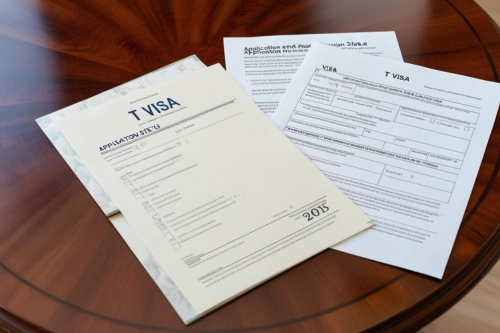@joshisimmigration This is the visa you’ve never heard about… but it could change your life. If your boss ever threatened to fire you or report you to immigration because of your status this might be the green card that no one told you about. It’s called the T Visa and it's specifically for immigrants who were trafficked or exploited at work. Many people think, “I don’t have papers, so I just have to take the abuse.” That is 100% FALSE. You have rights and protection might already exist for you. Were you: Forced to work insane hours under harsh conditions? 👉🏼Lied to about your job or salary? 👉🏼Threatened with ICE or deportation? 👉🏼Passed between employers or not allowed to leave? If ANY of this sounds familiar you may qualify for a T Visa, which not only shields you from deportation but also puts you on a path to a green card and lawful status. Immigrants shouldn’t be punished for someone else’s abuse. You’re not powerless. You deserve better. I’m Josh Goldstein, an immigration attorney fighting for people just like you. Let me help you stand up for yourself and secure your future. 📲 Tell me about your case link in bio. 📩 DM me or schedule your consult today. #tvisa #latinos #humantrafficking #immigrants #immigrationlawyer #spanglish ♬ original sound - Josh Goldstein, Esq.
The T nonimmigrant status visa for victims of human trafficking in the U.S. The T visa lets them live and work in the country. It also provides access to legal protection and benefits.
It protects you from deportation. It also allows you to apply for permanent residency after three years, if you meet certain conditions. In this article, we’ll cover everything you need to know about the requirements, application process, benefits, and more!
What Are the Requirements for the T Visa?
To apply, you need to meet specific criteria. This visa is meant for victims of exploitive migration. Here are the key T Visa eligibility requirements:
- Victim of Human Trafficking: You must have been a victim of trafficking for sexual or labor exploitation.
- Presence in the U.S. Due to Trafficking: You must be in the United States as a direct result of labor trafficking or have been brought into the country through coercion or fraud.
- Cooperation with Authorities (in Some Cases): In most cases, you must cooperate with law enforcement in investigating and prosecuting traffickers. However, exceptions exist if cooperation is unsafe or if there is a reasonable fear for your safety.
- Meeting Additional Requirements: Depending on your situation, other conditions may apply. For example, you may need to show that returning to your home country would put your safety or well-being at risk.

What Are the Benefits of the T Visa for Victims of Human Trafficking?
T Visa recipients gain access to crucial benefits that support their recovery and stability. The most significant benefits include:
- Protection from Deportation: You cannot be deported while under T nonimmigrant visa protection.
- Work Authorization (EAD): You’ll receive an Employment Authorization Document (EAD) that allows you to work legally in the U.S.
- Path to Permanent Residency (Green Card): After three years on a T Visa, you may apply for a Green Card and become a permanent resident.
- Access to Federal Benefits and Support Programs: You may qualify for federal assistance, including healthcare and financial support.
T Visa benefits for victims of sex trafficking include crucial assistance in recovering and rebuilding lives. This immigration status will allow you to access resources like healthcare and financial help.

How to Obtain a T Visa for Victims of Human Trafficking
Here’s a simple step-by-step guide on how to obtain a victims of human trafficking for victims of human trafficking:
- Gather the Necessary Documents: You need to provide evidence that proves you were a victim of labor trafficking. Documents required to apply for T visa include testimonials, medical reports, and witness statements. You also need proof of labor or sexual exploitation. Other supporting documents are important too. All these items are essential for your human trafficking visa application.
- Complete Form I-914: This form is used to apply for T nonimmigrant status. Make sure it’s filled out accurately, including the section where you describe your trafficking experience.
- Submit Your Application to USCIS: After filling out Form I-914 and gathering your documents, submit everything to U.S. Citizenship and Immigration Services (USCIS).
- Wait for a Decision: USCIS will review your application, which could take several months. You can track your case status on the USCIS website and check for updates on how long it takes to arrive at a decision for your T Visa.
- Receive USCIS Response: If your application is approved, you’ll be notified and can start accessing the benefits of the T Visa. If denied, you may appeal or explore other immigration options.
How Long Does It Take to Process a T Visa?
Many applicants wonder, T Visa how long does it take to arrive? Since this visa provides crucial protection, the wait time is a major concern for those seeking safety in the U.S.
Processing times vary based on USCIS workload and case complexity. On average, it can take 6 months to 1 year to receive a decision. However, factors like requests for additional evidence or a high volume of applications can extend the wait time.
To check your case status, visit the USCIS website and use the case tracking tool with your receipt number.
Get Expert Immigration Advice Today!
In times of uncertainty, staying informed is essential. That’s why Goldstein Immigration Lawyers has created this guide to keep you updated with the latest immigration information.
We’re here to help you navigate the T visa process. Our team offers expert immigration advice tailored to your situation. Please book a consultation with our expert Los Angeles team today!
T Nonimmigrant Visa FAQs
Here are answers to common questions about the T visa for trafficking victims.
1. Can I work with T nonimmigrant status?
Yes. People with this visa can apply for a Work Permit (EAD). This lets them work legally in the U.S. while their T nonimmigrant status is valid.
2. What happens if my T nonimmigrant visa is denied?
If USCIS denies your application, you will likely receive a notice explaining the reasons for the denial. Depending on your case, you may be able to file an appeal or a motion for reconsideration. In some cases, other immigration options may be available with the help of an attorney.
3. How long is the T nonimmigrant status valid?
The initial duration of T nonimmigrant status is four years. After three years, beneficiaries can apply for permanent residency (Green Card) if they meet certain requirements.
4. Can I travel with a T Visa?
Generally, individuals with T nonimmigrant status must apply for a travel permit before leaving the U.S. Without this permit, leaving the country could affect their status and make reentry difficult.
5. What happens if my T-visa isn’t approved?
You can ask the Administrative Appeals Tribunal to review your visa refusal. Most visa rejections can be appealed at the Migration Review Division of the AAT. It’s best to speak with an immigration attorney to help you.
Posted in: Blog
